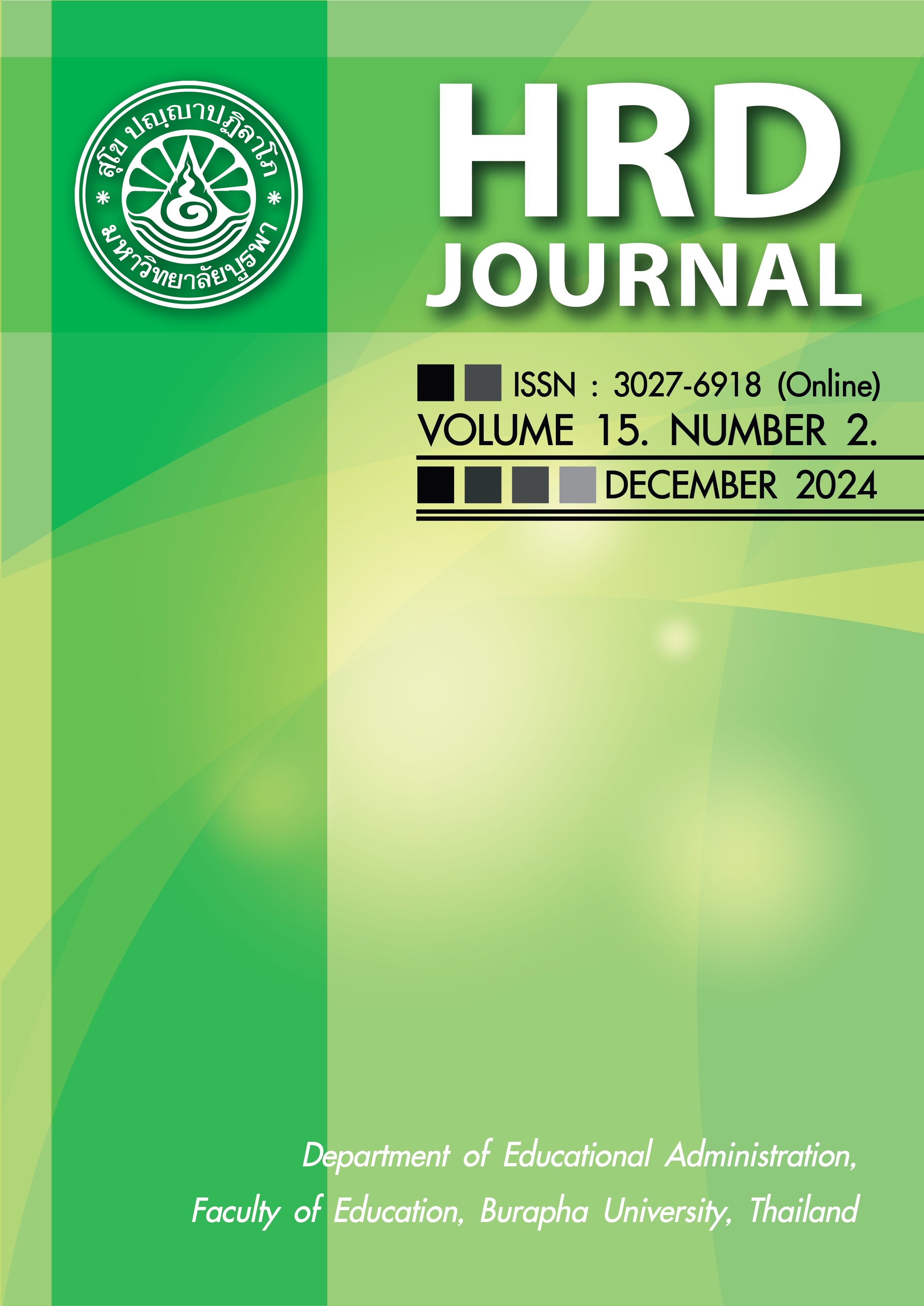Competency Development of School Administrators and Teachers in Managing Alternative Education of School Affiliated Chiang Mai Municipality
Keywords:
Competency, School Administrators, Teacher, Alternative Education, Chiang Mai MunicipalityAbstract
The objectives of this research were (1) to study the competency components of school administrators and teachers according to the alternative education concept in schools under Chiang Mai City Municipality, (2) to study guidelines for developing competencies of school administrators and teachers according to the alternative education concept in schools under Chiang Mai City Municipality, and (3) to examine and evaluate the guidelines for developing competencies of school administrators and teachers according to the alternative education concept in schools under Chiang Mai City Municipality. The research methodology consisted of (1) studying the competency components of school administrators and teachers according to the alternative education concept through document synthesis, (2) studying guidelines for developing competencies of administrators and teachers according to the alternative education concept in schools under Chiang Mai City Municipality using a 4-level rating scale questionnaire with a population of 22 school administrators and 241 teachers, along with structured interviews of 8 school administrators and teachers, and (3) examining and evaluating the feasibility and usefulness of the competency development guidelines for school administrators and teachers according to the alternative education concept, with a sample of 68 stakeholders as evaluators. Statistics used for data analysis included percentage, frequency, mean, and standard deviation. The research findings revealed that the competency components of school administrators according to the alternative education concept consisted of 6 competencies: (1) strategic thinking, (2) school management, (3) academic leadership, (4) networking and participation, (5) student care and support, and (6) innovation creation and technology use. The competency components for teachers consisted of 6 competencies: (1) teacher professionalism, (2) alternative education curriculum design, (3) learning management design, (4) media and technology use, (5) care for specific target groups of children, and (6) community relationship building. The development methods for school administrators and teachers with the highest usefulness and feasibility were knowledge management and information technology use, self-assessment and development, and collaborative networking. The activities with the lowest usefulness and feasibility were mentoring systems, coaching, and study visits.
References
กัญญาพัชญ์ กานต์ภูวนันต์ และ วีระวัฒน์ อุทัยรัตน์. (2562). รูปแบบการพัฒนาสมรรถนะการจัดการเรียนรู้ในศตวรรษที่ 21 ของครูโรงเรียนมัธยมศึกษาขนาดใหญ่พิเศษ สังกัดสํานักงานคณะกรรมการการศึกษาขั้นพื้นฐาน. วารสารครุศาสตร์ จุฬาลงกรณ์มหาวิทยาลัย,47(2), 1-17.
กองทุนเพื่อความเสมอภาคทางการศึกษา. (2566). หน่วยปฏิบัติการวิจัยเพื่อการพัฒนาด้านเด็กและเยาวชนโครงการต้นแบบการพัฒนาสมรรถนะครูนอกระบบการศึกษา. พรรณีพริ้นติ้งเซ็นเตอร์.
คณะกรรมการอิสระเพื่อการปฏิรูปการศึกษา. (2562). แผนการปฏิรูปประเทศด้านการศึกษา. สำนักงานสภาพัฒนาการเศรษฐกิจและสังคมแห่งชาติ. http://nscr.nesdc.go.th/wp-content/uploads/2022/03/แผนการปฏิรูปประเทศด้านการศึกษา.pdf (สืบค้นเมื่อ 23 มิถุนายน 2567)
ชนันภรณ์ อารีกุล.(2562).การศึกษาทางเลือก.สำนักพิมพ์แห่งจุฬาลงกรณ์มหาวิทยาลัย
ชนันภรณ์ อารีกุล,(2563). การศึกษาและการเรียนรู้ตลอดชีวิต แนวคิด หลักการและสาระสำคัญ. สำนักพิมพ์แห่งจุฬาลงกรณ์มหาวิทยาลัย
ชัยยนต์ เพาพาน (2559).แนวคิดและทฤษฎีพื้นฐานการเป็นผู้นำของผู้บริหารสถานศึกษาในศตวรรษที่ 21.วารสารบริหารการศึกษา มหาวิทยาลัยขอนแก่น,12(1),1-9.
เทศบาลนครเชียงใหม่ (2566).แผนพัฒนาท้องถิ่นเทศบาลนครเชียงใหม่ (2566 – 2570).เทศบาลนครเชียงใหม่.
ธนกฤต อั้งน้อย (2562).รูปแบบการพัฒนาสมรรถนะครูใหม่ในศตวรรษที่ 21 ตามแนวคิดโรงเรียนเป็นองค์การแห่งการเรียนรู้.[วิทยานิพนธ์ปริญญาดุษฎีบัณฑิต].มหาวิทยาลัยนเรศวร
ธีระ รุญเจริญ. (2562). การศึกษาความสัมพันธ์ระหว่างภาวะผู้นำทางวิชาการของผู้บริหารสถานศึกษากับการจัดการเรียนรู้ในศตวรรษที่ 21. วารสารศึกษาศาสตร์ มหาวิทยาลัยบูรพา, 30(2), 15-28.
ธีรศักดิ์ อุปไมยอธิไชย, พิทยา แสงสว่าง และน้ำทิพย์ องอาจวาณิชย์.(2567). การประเมินกรอบสมรรถนะครูเอเชียตะวันออกเฉียงใต้ (ซี-ทีซีเอฟ). วารสารวิชาการศึกษาศาสตร์ศรีนครินทรวิโรฒ, 25(1), 189-202.
บุญชม ศรีสะอาด. (2556). วิธีการทางสถิติสำหรับการวิจัย (พิมพ์ครั้งที่ 5). กรุงทอง การพิมพ์.
พศุ เดชะรินทร์ (2546). กลยุทธ์ใหม่ในการจัดการ. ผู้จัดการ
พรใจ ลี่ทองอิน.(2559). การศึกษาทางเลือก. สารานุกรมศึกษาศาสตร์, 51(2559), 22- 30.
ล้วน สายยศ และ อังคณา สายยศ. (2536). เทคนิคการวิจัยทางการศึกษา (พิมพ์ครั้งที่ 3). ศูนย์ส่งเสริมวิชาการ
วีระเทพ ปทุมเจริญวัฒนา. (2564). การศึกษาทางเลือก.สำนักพิมพ์แห่งจุฬาลงกรณ์มหาวิทยาลัย
สำนักงานคณะกรรมการการศึกษาขั้นพื้นฐาน. (2553). คู่มือการประเมินสมรรถนะครู (ฉบับปรับปรุง พ.ศ. 2553). สำนักงานคณะกรรมการการศึกษาขั้นพื้นฐาน
สำนักงานเลขาธิการคุรุสภา (2565) การพัฒนาสมรรถนะครูและองค์ความรู้ตามมาตรฐานวิชาชีพครูสำหรับผู้ประกอบวิชาชีพครู ในยุคศตวรรษที่ 21. สำนักงานเลขาธิการคุรุสภา.
สุพรรณี มาตรโพธิ์. (2563). ภาวะผู้นำทางวิชาการของผู้บริหารสถานศึกษาที่ส่งผลต่อประสิทธิผลของโรงเรียน สังกัดสำนักงานเขตพื้นที่การศึกษามัธยมศึกษา เขต 8 [วิทยานิพนธ์ปริญญามหาบัณฑิต]. มหาวิทยาลัยราชภัฏกาญจนบุรี.
Bass, B. M., & Riggio, R. E. (2006). Transformational leadership (2nd ed.). Lawrence Erlbaum Associates
Publishers.
Bronfenbrenner, U. (1979). The ecology of human development: Experiments by nature and design. Harvard University Press.
Darling-Hammond, L., & Hyler, M. E. (2020). Preparing educators for the time of COVID and beyond. European Journal of Teacher Education, 43(4), 457-465.
Division of Education Elementary and secondary education. (2023). Competencies for teachers: alternative learning grades K-12. Retrieved March 26, 2024, From https://dese.ade.arkansas.gov/Files/Alternative_Learning_K12_Teacher_Competencies_final_2023_EEF.pdf
Donnelly, J. A. (2021). Alternative education: A different way of thinking, learning, and being. In L. Wellner & K. Pierce-Friedman (Eds.), Supporting early career teachers with research-based practices (pp. 272–292). IGI Global.
McClelland D. C. (1973). Testing for competence rather than for Intelligence. American Psychologist, 28(1), 1-14.
Ministry of Education, New Zealand. (2023). Alternative education guidelines. Retrieved January 26,2024, from
https://alternativeeducation.tki.org.nz/Alternative-education
OECD. (2023). The resilience of education systems, schools and students figures and tables. In PISA 2022 Results (Volume II): Learning During and From Disruption. OECD Publishing.
Sanders, M. G. (2018). Crossing boundaries: A qualitative exploration of relational leadership in three full-service community schools. Teachers College Record, 12(4), 1-36.
Sahlberg, P. (2021). Finnish lessons 3.0: What can the world learn from educational change in Finland? (3rd ed.). Teachers College Press.
Weise, M. R. (2020). Long life learning: Preparing for jobs that don't even exist yet. Wiley.
UNESCO. (2011). Leadership and education. UNESCO: Geneva.
UNICEF.(2022). A strategic framework on alternative education for out-of-school adolescents in Latin America and the Caribbean. UNICEF Latin America and Caribbean Regional Office.
Zambas. J (2020). 25 Essential skill and quality every teacher need. Retrieved from https//www.Greeraddict.com/Teacher-Skills.
Downloads
Published
How to Cite
Issue
Section
License
Copyright (c) 2024 Department of Educational Administation, Faculty of Education, Burapha University

This work is licensed under a Creative Commons Attribution-NonCommercial-NoDerivatives 4.0 International License.
Copyright@HRD Journal, Burapha University






